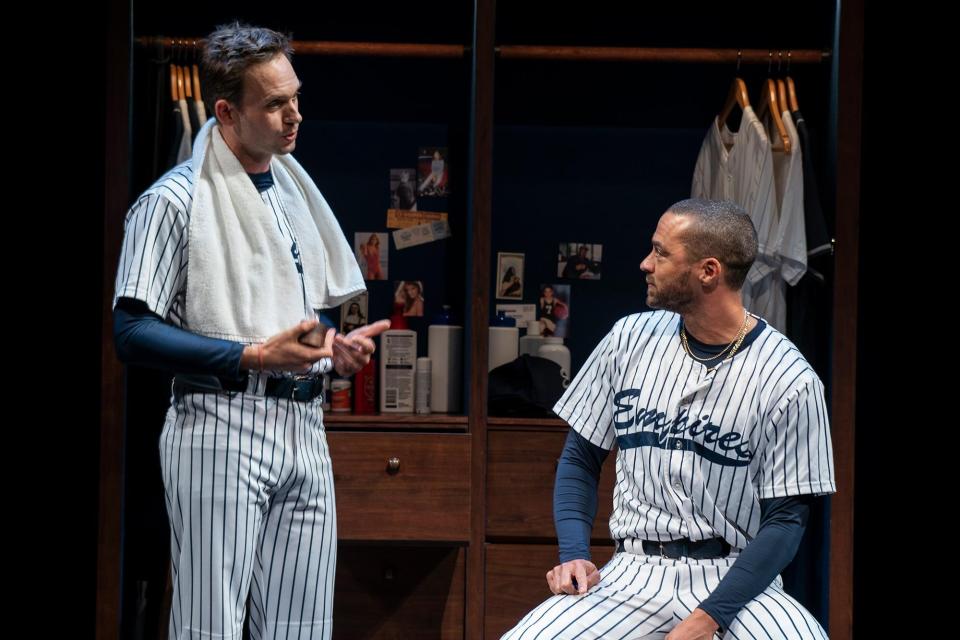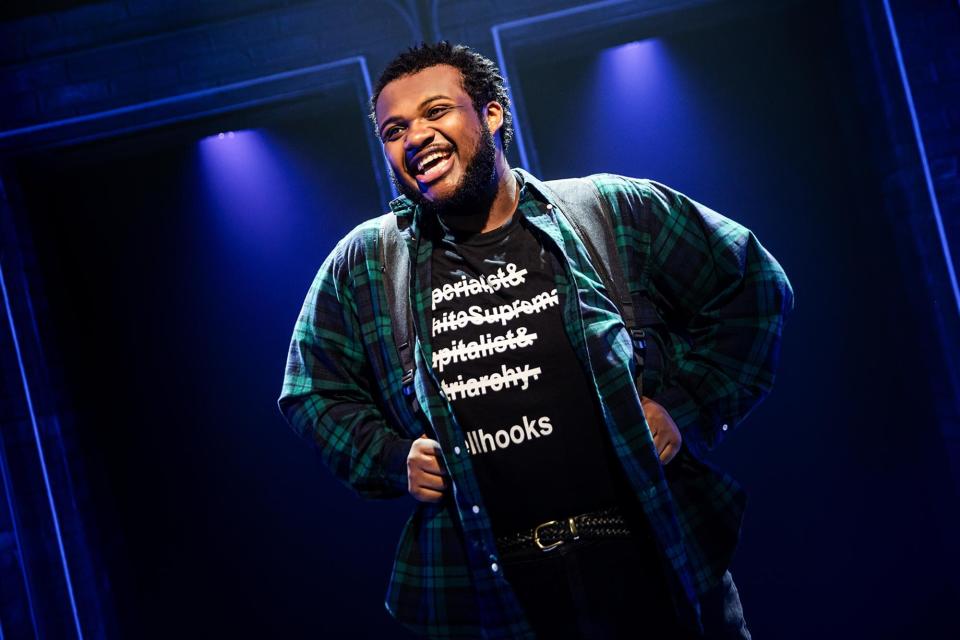Jesse Williams, Michael R. Jackson, and Camille A. Brown on the 2022 Tony nominations and Black excellence
- Oops!Something went wrong.Please try again later.
In the summer of 2020, Broadway — like the rest of America — faced a racial and cultural reckoning.
But thanks to COVID-19, stages were dark and theaters were empty, meaning any sort of substantive change would have to wait. With the footlights now illuminated once more, has there been any true transformation?
If this month's Tony Award nominations are any indication, the needle has moved... somewhat. A Strange Loop, a musical about a queer Black man writing a musical about a queer Black man writing a musical (and on and on in that titular loop) earned 11 nods — the most this season.
Jesse Williams, fresh off Grey's Anatomy and in his stage debut, snagged a nomination for playing a bi-racial baseball player who comes out in the first revival of Richard Greenberg's Take Me Out.

Joan Marcus Patrick J. Adams and Jesse Williams in 'Take Me Out'
The first Black woman to both direct and choreograph on Broadway in 67 years, Camille A. Brown was recognized for her work on For Colored Girls Who Have Considered Suicide/When the Rainbow Is Enuf in both categories.
Nominations were also bestowed upon Clyde's, Skeleton Crew, Paradise Square, MJ, Trouble In Mind, Lackawanna Blues, and more. The Broadway League has made it a priority, it seems, to celebrate Black achievement this season — but how can we ensure this isn't just a temporary step forward?
"We have to continue to challenge the system," Brown tells EW. "My question is, 'And now what?' How do we continue that conversation? How do we get more people that have diverse and dimensional stories to speak? How do we bring in more audiences, and more Black audiences? We have Black theater nights. How do we turn that into Black theater weeks, Black theater month, a whole season?"
Michael R. Jackson, who spent 16 years developing A Strange Loop from his one-man show into a musical, echoes that, saying the questions should be about the content of the storytelling, not some arbitrary number or quota: "There could be 41 Black plays in all the theaters and that [might not] be enough. There could be three amazing plays in three Broadway theaters and that could be incredible," he reflects. "You have to talk about what's on Broadway, not just who's on Broadway. It has to be about what we're doing and how audiences receive that. As a Black writer, I'm hungering for more conversations about the quality of our artistic output. For me, it's not enough to just say, 'He's here.' Who cares? I don't care that I'm here. It will be enough when those conversations take precedence over the very fact of my existence on a commercial Broadway stage."

Marc J. Franklin Jaquel Spivey in 'A Strange Loop'
Williams — who has long used his platform to speak out on issues of race and equity — says that it ultimately comes down to audiences, particularly white viewers, seeking out material that doesn't merely tell stories about people who look like them. "It's really not a question for Black creatives," he asserts. "Every other racial demographic has demonstrated, throughout time, a willingness and readiness to find themselves in characters that look different from them. We're reared by seeing ourselves in other bodies. Only in the white world is there a refusal to do that."
Williams says a true sign of progress in the theater will also come via the types of stories being told by BIPOC artists. "There is no one way to be a Black man or a woman," he notes. "We're not a homogenous group. We're not monolithic. There's no more diversity within the Black storytelling world and Black experience than there is outside of it. We're on the right track. We're just going to have the dominant culture pick up some of the slack."

Joan Marcus; Alberto E. Rodriguez/Getty Images; Marc J. Franklin
That extends to not "othering" the work in criticism. Many reviews of A Strange Loop have celebrated the musical and the way it innovates the form, while the reviewer also mentions that the work is "not for them," whatever that means. Jackson is optimistic that the Tony love and audience responses will translate into engagement with his work, which he describes as a "mirror-window" experience. "The thing that theater is so good about is promoting a shared humanity," he says, "enabling you to see yourself in other characters who are not you. For some people, my show is a mirror. And for other people, it's a window. People can sit together in the same space and see the same story, which is very specifically about a young Black gay man, but they can find something in his experience of being a human being that speaks to them no matter where they come from. That's been very radicalizing to me, because we live in such a divisive world."
In fact, Jackson's greatest hope is that stage productions like his can prove a conduit to inspire empathy and lead everyone to find connective tissue no matter their background. "Theater is a unique institution that is live and in-person with people breathing the same air," he concludes. "You can come together in a shared space and you can watch a story and it can inspire a sense of empathy among you — with your neighbor, with people on stage, with characters, all of those things. That's the beauty of theater."
We'd say that deserves a standing ovation.
Check out more from EW's The Awardist, featuring exclusive interviews, analysis, and our podcast diving into all the highlights from the year's best in TV.
Related content:

